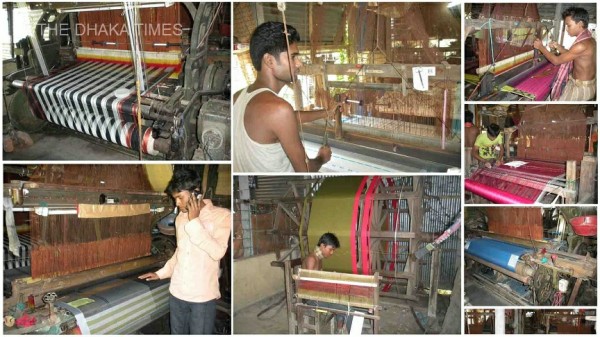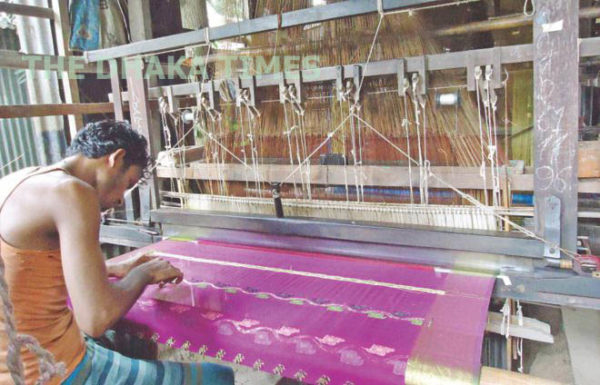One of the industries of Tangail is weaving. Tangail weave sarees are popular worldwide. But with the invasion of Indian sarees, this industry is facing an existential crisis today. Sohan Ahmed has sent this report about Tangail's loom sarees from Tangail.

Tangail woven sarees are at the peak of demand and popularity among the wives and daughters of high-ranking government officials, wealthy businessmen and bureaucrats, for Muslim Eid, Hindu puja and all other religious festivals. One of the industries of Tangail is weaving. The sarees made in this weaving industry are known worldwide beyond the country's borders. It is a tradition of the Bengali nation for thousands of years.
The famous traveller, Ibn Battuta came to this country and wrote about the weaving industry of Tangail. Transcending the boundaries of South Asia, Tangail's handlooms have conquered Europe and America. The world-wide reputation that Tangail's weaving industry has achieved today did not come overnight. Due to the immense sacrifice, devotion and tireless work of the Basaks, the once simple handloom saree of Tangail has become known as the famous Tangail saree today. According to history, the weavers of the Basak community are the original weavers of Tangail. They can also be called a class of nomads. He came to Murshidabad in West Bengal from the Indus Basin and started weaving sarees. As the quality of saris is not good in the weather there, Basakras go out in search of new places. Comes to Rajshahi region of Bangladesh. As the weather there was not so good, the Basakas divided into two groups, one group moved to Bajitpur in Kishoreganj, the other group moved to Dhamrai in Dhaka. Some of them stayed in Rajshahi after being associated with silk work.

As the quality of saris in Dhamrai was not very good, he came and settled in Tangail in search of a better place. As the climate of Tangail is suitable for weaving loom sarees, Basakras started weaving in full swing. At one time most of Tangail was inhabited by Basaks. They used to train the inexperienced in cloth weaving through Basak Samiti. After the independence of the country, Basak weavers moved to Bhar. At that time, apart from the Basaks, other communities also became deeply involved in the weaving industry. They also became skilled like basak weavers. At present the most handloom rich areas of Tangail are Bajitpur, Suruj, Bertha, Tarutia, Belta, Garasin of Tangail Sadar Upazila. Balasna, Rampur, Mominnagar, Singair, Chhatihati, Kamanna, Tenguria, Nagbari, Ghonabari, Jorbari, Tezpur, Gandhina, Baratiabari, Bangra, Sahdevpur, Kazibari, Darikhshila, Kadim Khashila, Kukrail of Kalihati Upazila. Tangail sarees are made in villages like Pathrail, Nalsandha of Delduar upazila.
In these areas, the sound of spiders can be heard from morning to night. One can see the scene of weavers weaving sarees by hand. The livelihood of over five lakh people is connected with the lakhs of handlooms of Tangail. Tangail Sarees are woven by men, while women help by spinning the yarn on the spinning wheel. There are several types of Tangail saree weaving looms, Chittaranjan (Mihi), Pitlum (Khat-Khti), Automatic, Semi Automatic looms are notable. Sarees of different colors and designs are made on these looms. We spoke to Md. Aminur Islam, the owner of Sohan Weaving Factory located in Balla village.
He said that in Balla and nearby factories, Jamdani, Baluchuri, Soft Silk, Half Silk, Hazarbuti, Thane, Benarashi, Suti Par, Katki, Swanchur, Anarkali, Devdas, Kumkum, etc. and common name sarees are made. He also said that sarees have different prices due to different names and quality. Starting from minimum 250 taka to above 15 thousand taka. Among them, the price of Jamdani is the highest. Jamdani is made of international standards. 82 count thread is used to make this saree. 82 count thread is also used to make other sarees. 60, 62, 74, 82, 84 count yarn manufactured in Narayanganj is also used.
Before the partition of the country, the sari market of Tangail weavers was located in Kolkata. Weavers from different parts of Tangail used to go to Calcutta by steamers, launches and ships via Charabari Ghat. Since the partition of the country, the main markets of Tangail sarees used to be located in Bajitpur, Kartia, Kalihati in Tangail. Most of the buyers in these markets are moneylenders. Moneylenders buy sarees at wholesale prices from those haats and sell them in big markets and shopping malls across the country. Apart from moneylenders, wives and daughters of high-ranking government officials of various districts, rich businessmen and bureaucrats also bought sarees of their choice from those haats. Across the borders of the country, various countries of Europe, America, Japan, and various states of India appreciate Tangail's loom sarees, but due to the non-availability of raw material supply, the cost of production increases due to the increase in the price of raw materials and various components.
Advancement of Indian Sarees
As Indian sarees are cheaper than Tangail handloom sarees, many buyers gravitate towards them, the Tangail sarees are losing ground in the international market due to lack of proper marketing system due to being trapped in the hands of moneylenders. Tangail saree has managed to hold its market despite all the odds. Because Tangail saree means saree with different features made on different threads. There are variations in its designs, weaves and even colors. Also, the attractiveness and design techniques of Tangail sarees are changing day by day in keeping with the demand of time. Tangail weavers also make towels, lungis and chadars. Despite all this, today the weaving industry is under threat due to the competition of the mechanical industry. Most of the weavers have somehow sustained this weaving industry, these non-human workers are needed to sustain the weavers. Loans on easy terms and government sponsorship.
# Thanks to: Sohan Ahmed, Balla, Kalihati, Tangail.


